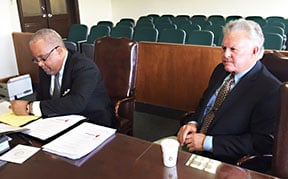Public Information
Auditor faults Austin’s public information process
Law Enforcement Lobby Blocking Family Access to Info About Deceased Suspects
Court Guts Open Meetings Act
SOS v Daugherty Pending Decision
SOS v Daugherty Pending Decision
Travis County seeks dismissal of lawsuit against
county commissioner, SOS wants more records
by Ken Martin
© The Austin Bulldog 2015
Posted Tuesday July 21, 2015 12:58pm
Updated Tuesday, July 21, 2015 5:03pm (to include a link to the SOS Alliance’s original petition)
In an ongoing battle over whether State Highway 45 Southwest will be built over the environmentally sensitive Barton Springs portion of the Edward Aquifer, the Save Our Springs Alliance is waging a two-pronged attack, through both a civil lawsuit and a criminal complaint, on Travis County Precinct 3 Commissioner Gerald Daugherty, the leading proponent of the project.
Both actions claim that Daugherty violated the Texas Public Information Act, which provides both civil and criminal penalties for violations.
 The criminal case is being held in abeyance until the lawsuit is resolved. To that end, a nearly three-hour hearing was held July 13 before Judge Stephen Yelenosky of the 345th Judicial District Court.
The criminal case is being held in abeyance until the lawsuit is resolved. To that end, a nearly three-hour hearing was held July 13 before Judge Stephen Yelenosky of the 345th Judicial District Court.
 Assistant County Attorney Tony Nelson, who represents Daugherty, contends the lawsuit should be dismissed.
Assistant County Attorney Tony Nelson, who represents Daugherty, contends the lawsuit should be dismissed.
Nelson filed a Plea to Jurisdiction April 8, 2015, meant to refute claims made by SOS in the lawsuit and request dismissal because Daugherty and Travis County have exhausted all means of finding and providing the records that SOS requested in its public information request.
The SOS request was for any e-mails, memoranda, and attachments sent or received by Daugherty or his executive assistants that referenced the proposed SH45 SW that were sent or received between January 1, 2013, and the date of the request, May 10, 2013. The request covered the beginning months of Daugherty’s current term in office.
Issues before the court
City to Rodgers’ Lawsuit: Fuhgeddaboudit
City to Rodgers’ Lawsuit: Fuhgeddaboudit
City of Austin’s answer claims suit is moot
as it has provided all responsive records
by Ken Martin
© The Austin Bulldog 2015
Posted Monday July 6, 2015 4:04pm
 The City of Austin is in effect thumbing its nose at the lawsuit filed by longtime civic activist Brian Rodgers concerning alleged failure to supply records he had requested about a trio of controversial projects.
The City of Austin is in effect thumbing its nose at the lawsuit filed by longtime civic activist Brian Rodgers concerning alleged failure to supply records he had requested about a trio of controversial projects.
The City claims the suit is moot because it’s already produced all the public records responsive to Rodgers’ public information requests.
 “This is incredible,” said attorney Bill Aleshire of Aleshire Law PC, who represents Rodgers in this legal action and filed the lawsuit June 11.
“This is incredible,” said attorney Bill Aleshire of Aleshire Law PC, who represents Rodgers in this legal action and filed the lawsuit June 11.
The lawsuit claims the city failed to comply with the Texas Public Information Act (TPIA) in responding to several requests in which Rodgers asked for records involving:
• Correspondence between City officials and the Downtown Austin Alliance (DAA) while plans for a light rail election were being devised,
• Records about how the plan was formulated to allow some 700 acres of Walter E. Long parkland to be turned over to a for-profit developer without getting voter approval as required by the Austin City Charter.
• Records about the city’s failure to timely respond to notice from the Texas Department of Transportation and losing the opportunity to purchase surplus property on Bull Creek Road that could have been developed as a park but instead went to a private for-profit developer.
“The factual allegations in the lawsuit are still true,” Aleshire said. “We have received nothing from the city in response for the request for the City Council communication with DAA. Even after I warned them, pre-suit, that we had received nothing on that request, I’ve received no response.”
Next move will be discovery
City Sued Over Public Records
City Sued Over Public Records
Brian Rodgers lawsuit alleges failure to lawfully
respond to requests on three high-profile topics
by Ken Martin
© The Austin Bulldog 2015
Posted Friday, June 12, 2015 1:41am
Updated Saturday, June 13, 2015 2:57pm
 Longtime civic activist Brian Rodgers filed a lawsuit late yesterday against the City of Austin over the city’s alleged failures to comply with the Texas Public Information Act (TPIA) in responding to his requests for records involving several controversial matters.
Longtime civic activist Brian Rodgers filed a lawsuit late yesterday against the City of Austin over the city’s alleged failures to comply with the Texas Public Information Act (TPIA) in responding to his requests for records involving several controversial matters.
The lawsuit seeks an expedited hearing on a mandamus to order the City of Austin to supply all information that Rodgers asked for in three public information requests.
 “This lawsuit demonstrates that the claim by management of the City of Austin that it is dedicated to ‘transparency and accountability’ is a farce,” states the lawsuit, filed on behalf of Rodgers by attorney Bill Aleshire of Aleshire Law PC. (Brian Rodgers, Plaintiff, v. The City of Austin, Defendant, Cause No. D-1-GN-15-002291.) Aleshire represented The Austin Bulldog in two TPIA lawsuits against the City of Austin in 2011.
“This lawsuit demonstrates that the claim by management of the City of Austin that it is dedicated to ‘transparency and accountability’ is a farce,” states the lawsuit, filed on behalf of Rodgers by attorney Bill Aleshire of Aleshire Law PC. (Brian Rodgers, Plaintiff, v. The City of Austin, Defendant, Cause No. D-1-GN-15-002291.) Aleshire represented The Austin Bulldog in two TPIA lawsuits against the City of Austin in 2011.
Rodgers’ public information requests involved:
• Correspondence between City officials and the Downtown Austin Alliance while plans for a light-rail election were being devised.
• Records about how the plan was formulated to allow some 700 acres of Walter E. Long parkland to be turned over to a for-profit developer without getting voter approval as required by the Austin City Charter.
• Records about the city’s failure to timely respond to notice from the Texas Department of Transportation and losing the opportunity to purchase surplus property on Bull Creek Road that could have been developed as a park but instead went to a private, for-profit developer.
 Aleshire e-mailed a copy of the lawsuit to Mayor Steve Adler late Thursday. The Austin Bulldog e-mailed a request for the mayor’s comments Thursday evening. Adler did not immediately respond to the e-mail. or a voice mail message left for one of the mayor’s staff members.
Aleshire e-mailed a copy of the lawsuit to Mayor Steve Adler late Thursday. The Austin Bulldog e-mailed a request for the mayor’s comments Thursday evening. Adler did not immediately respond to the e-mail. or a voice mail message left for one of the mayor’s staff members.
Late Friday afternoon, an Adler staff member sent a prepared statement from Adler: “I can’t comment on pending litigation, but the City of Austin should and must comply with all provisions of the Texas Public Information Act, including the production of responsive information when sought by the general public.”
City’s inattention, inaction unlawful
Surfing New Wave Open Government
Surfing New Wave Open Government
Symposium panelist says local efforts show
potential but Austin not open government leader
by Mark Henricks
© The Austin Bulldog 2015
Posted Thursday April 23, 2015 10:44am
New technology and new ideas promise to make government more open than ever, perhaps even someday replacing politicians with direct decision-making by citizens, according to panelists in a discussion of innovation in open government held this month at Austin City Hall. At the same time attendees were warned of the risk of disenfranchising those who lack access to technology. And, while panelists lauded Austin’s image as a center of technology, the city government’s reputation for openness and transparency was said to be unremarkable.
The session took place April 9, 2015, as part of the City of Austin’s Open Government Symposium. This is the second city-sponsored symposium since 2012, when all City of Austin elected officials agreed to deferred prosecution after an Austin Bulldog investigation into their open meetings violations.
 Kerry O'Connor, the city’s first chief innovation officer, moderated the panel. She was joined by Mary Beth Goodman, a senior fellow with the Washington, D.C, think tank, Center for American Progress, and Nathaniel Heller, managing director of the Results for Development Institute, a Washington, D.C. economic development research group.
Kerry O'Connor, the city’s first chief innovation officer, moderated the panel. She was joined by Mary Beth Goodman, a senior fellow with the Washington, D.C, think tank, Center for American Progress, and Nathaniel Heller, managing director of the Results for Development Institute, a Washington, D.C. economic development research group.
 Cities like Austin are on the front line in the effort to make government more transparent, according to Goodman, who was formerly director for international economic affairs on the White House national security staff. “The more we've gotten into the process, the more we've learned that citizens want to engage first and foremost at the city level,” Goodman said.
Cities like Austin are on the front line in the effort to make government more transparent, according to Goodman, who was formerly director for international economic affairs on the White House national security staff. “The more we've gotten into the process, the more we've learned that citizens want to engage first and foremost at the city level,” Goodman said.
 Heller, much of whose work has dealt with less-developed countries around the world, cited crowdsourcing as an example of openness that is well-suited for city government. “This is being experimented with nationally, but it's working better at the local level,” he said. Examples of using crowdsourcing in government include holding challenges and contests to get citizens to contribute their ideas about how to solve problems delivering needed city services.
Heller, much of whose work has dealt with less-developed countries around the world, cited crowdsourcing as an example of openness that is well-suited for city government. “This is being experimented with nationally, but it's working better at the local level,” he said. Examples of using crowdsourcing in government include holding challenges and contests to get citizens to contribute their ideas about how to solve problems delivering needed city services.
O’Connor, who took over the city innovation office in 2014 after working for the U.S. State Department, said Austin has employed crowdsourcing-type tools with mixed success. “It is a nascent movement and takes a little practice to get it right,” she said. City efforts to encourage citizen contributions include CodeNEXT, an initiative to create a new land development code addressing affordability and other issues. The innovation office partnered with three volunteer working groups to generate recommendations for the program, but it still a work in progress.
Openness impedes efficiency?







